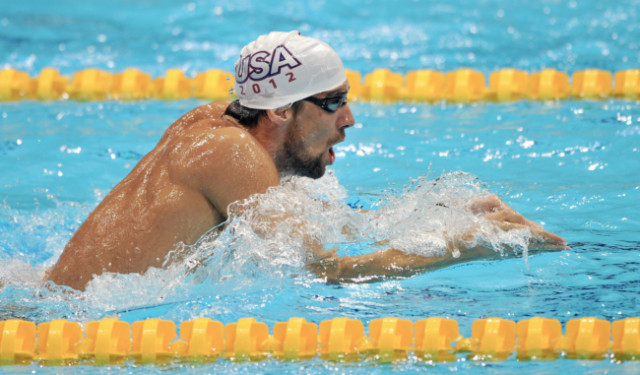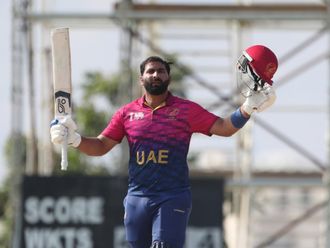
New York: Unlike Beijing four years ago, Michael Phelps is going to have to share the swimming spotlight at the London Olympics.
There will be no record gold medal haul this time and there is the chance he might even lose a race or two but for the American and his fellow competitors, that’s a cause for celebration, rather than distress.
Phelps might slice through the water as smoothly as a dolphin and possess the same predatory instincts of a killer shark, but in 2008, he may as well have been living in a tiny fish bowl.
His incredible performance in winning an unprecedented eight gold medals ensured that he was the single most scrutinised competitor at the Olympics, but the pressure was suffocating.
He will still be under the microscope when the world’s best swimmers turn the London Aquatics Centre into their own golden pond but the expectations on him have all but evaporated and his relief is obvious.
He has already declared that he will retire after London and by reducing his schedule, albeit from eight to seven events, the 27-year-old has ensured his Olympic farewell will be a deserving lap of honour rather than his coronation.
“I’m still excited about the Olympics. It’s the biggest stage to perform at,” he said. “It’s going to be fun, and I’m looking forward to it.”
Phelps struggled for motivation after Beijing but rediscovered his zest for training and still has some mind-boggling goals in his sights.
He already has a record 14 gold medals and two bronzes and needs just three medals of any colour to surpass Soviet gymnast Larisa Latynina’s overall record of 18.
If he wins the 100 metres butterfly, 200m butterfly, 200m individual medley and 400m individual medley, he could become the first male swimmer to win the same individual event at three Olympics.
“If I go out and do the best that I can and don’t medal or get a bronze or a silver, at the end of the day there aren’t many people that can say they have this,” he said.
Despite his apparent lack of conviction, Phelps has great prospects in all of his events, which include the three relays, but does face a tough challenge turning everything he touches to gold this time.
His biggest danger comes from American team mate Ryan Lochte, who has also entered an energy-draining four individual events, including both medleys, where he will go head to head with Phelps.
It is a daunting task filled with risk but the 27-year-old from Florida is up for the challenge.
“I feel like this is my time,” he said. “I have definitely put in the work and it’s something that I believe so strong that I know I can make this happen.”
While the rivalry between Phelps and Lochte is sure to provide some mouthwatering clashes, the pair might yet be upstaged by another of their compatriots, Colorado teenager Missy Franklin.
No female swimmer has ever won more than six medals at a single Olympics but the 17-year-old has qualified for seven events.
The inevitable comparisons with Phelps are a heavy burden but she remains unfazed and US Olympic team officials are bubbling with excitement about her prospects.
“I think Missy has the potential of being on multiple Olympic Teams and help the US not just for the next month but hopefully the next generation of great swimmers,” said Teri McKeever, the head coach of the American women’s team.
The US are again expected to win the lion’s share of the medals in London after recording the fastest times this year in 12 of the 26 individual events but the challengers are lining up on the blocks.
Australia, another traditional swimming powerhouse, again has bright prospects, especially in the men’s freestyle sprints and women’s events.
James Magnusson is the overwhelming favourite to win the 100m freestyle, the blue riband event in the pool, and anchor the Australians to victory in the 4x100m freestyle relay.
Stephanie Rice, a triple gold medallist in Beijing, remains a potent force in the medleys while Leisel Jones and Libby Trickett both came out of retirement to try and add to their gold medal collections.
Asia are rapidly catching up to the US and Australia and are lurking among the big winners when London hosts the swimming events in the first week of the Games.
China’s Sun Yang, one of only two men to break world records since the ban on performance enhancing bodysuits after 2009, is the runway favourite to win the 1500m freestyle, the longest and most gruelling event in the pool.
South Korea’s Park Tae-hwan defends the 400m freestyle title he won in Beijing while Japanese breast-stroker Kosuke Kitajima is bidding, along with Phelps, to three-peat.
Europe have a strong hand in the women’s events, with Ranomi Kromowidjojo of the Netherlands setting the fastest times in the world this year in the 50m and 100m freestyle, and Italy’s Federica Pelligrini lurking as the woman to beat in the 200m and 400m freestyle after completing the middle distance double at the last two Olympics.
The host-nation also has a great chance of a rare Olympic swimming gold with Rebecca Adlington, on course for more success after she won the 400m and 800m titles in Beijing, ending a 48-year drought for British female swimmers.
In addition to the 32 events in the pool, the aquatics programme in London will also include 10 kilometre open water races, diving and water polo.











